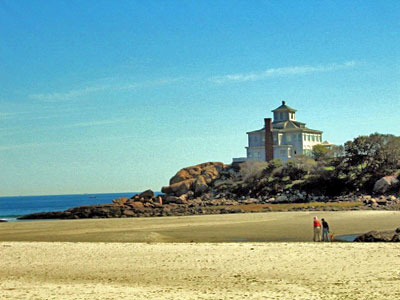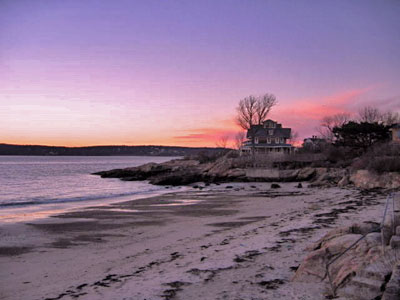Ghosts of Gloucester
Come venture to Gloucester, Massachusetts, and you might witness ghosts of fishermen past, who have returned from their nautical graveyard for one last stroll down its seaworthy streets. For centuries, like thick chowder, the insular waters of the Atlantic were saturated with fish; hearsay dictated you could simply reach down and scoop them out with your hands. Though the fishing industry has waned over the years, it is still the heartbeat of Gloucester. If you listen and watch carefully, you might catch a glimpse of these past nautical heroes; their transparent outlines frolicking about their beloved town, ensuring its core beauty is never lost.
Good fortune afforded me the opportunity to visit Gloucester for an extended weekend in August of 2005. My college roommate, Eric, had relocated to this seaside town that anchors Massachusetts’ lesser-known Cape, Cape Ann.
Gloucester is quintessential New England with Victorian architecture, narrow streets, and independent businesses on every corner. Incorporated as a city in 1623, it is inhabited by a potpourri of fishermen, tourists, moneyed newcomers, and coastal bluebloods, who coexist amicably in this fishing village that is reinventing itself.
Buoyed by the blockbuster film “The Perfect Storm”, many tourists come to Gloucester to witness an authentic coastal port town from another era made famous onscreen. Upscale businesses and homes are shaking up blue-collar Gloucester, transforming it into the de facto “Newport of the North.” My native Rhode-Islander mother, Virginia Regan, says Gloucester is what Newport once was, before all the tourists and out-of-towners forever changed the character and makeup of the city.
Gloucester is a similar case study to Newport. The town is on a precipice, at a virtual crossroads of accepting its natural growth versus retaining its storied past. The famous Gloucester Fisherman statue has been buttressed with a list erected on a semicircle of ten granite blocks. The list, cast in bronze, contains over 5,000 names of men who have been lost at sea. But have they really been lost?
 Unlike Newport and Nantucket, the fishermen have not been pushed out of Gloucester. They are still treated as hometown heroes and the drawing card for the region. Fishing boats surround the waterfront eateries in Gloucester’s storied inner harbor with fitting names such as “One More Cast,” “Doctor's Orders” and "Bream Reaper." The fishing boats aren’t replicated for show; these views of Gloucester are authentic.
Unlike Newport and Nantucket, the fishermen have not been pushed out of Gloucester. They are still treated as hometown heroes and the drawing card for the region. Fishing boats surround the waterfront eateries in Gloucester’s storied inner harbor with fitting names such as “One More Cast,” “Doctor's Orders” and "Bream Reaper." The fishing boats aren’t replicated for show; these views of Gloucester are authentic.
Eric moved to Gloucester mainly because of its affordability and his love of the ocean. Our visit coincided with Eric’s restoration of a former sea captain's house atop Gloucester’s highest point, “Portagee Hill”— a colloquial description of the area once populated largely by Portuguese Fishermen. Eric, decoupled from his previous pairing, was forced to sell his home in the upscale suburb of North Reading, Massachusetts, divide the proceeds, and launch a new life on his own. He found Gloucester to be the perfect setting for his next journey. Eric did not just buy a house. He bought into an historical town, thereby securing a piece of living, breathing history. The former captain's quarters abode went though its own perfect storm in the middle of a New England winter in 2005. The pipes burst, causing significant damage to the first two floors of the beautiful old home. Eric remained unbowed, steadfastly refusing to let this reversal of fortune hinder his rebirth.
“Portagee Hill,” full of unemployed or partially employed “handymen” who work for cash in between fishing expeditions, was fertile ground for Eric to employ some of his neighbors and make valuable inroads into the historic community. The restoration has taken over a year to complete. In the interim, Eric has acquired the angler’s craft and in the process learned all about the rich history of Gloucester, Massachusetts. He joined the local Elks Club and now enjoys Friday afternoon pints with wizened men of the sea who have been to the Flemish Cap and back, and lived to tell about it. These “old salts” elocute about the ghosts of Gloucester, describing in vivid detail how these apparitions watched over their journeys at sea. Eric, the new pupil in the schoolhouse, is all ears for the weekly tutorial and often takes care of the tab for these heroic gentlemen.
Like Gloucester itself, Eric's house was in transition when I visited. Cities, like people, are often most interesting and alluring when they are going through a metamorphosis. One yearns for the old town (the fishermen) but also champions the move towards the vitality brought by tourism and attracting business.
The gathering of guests was to launch the new Eric, in his newly embraced city of Gloucester. Eric had spent almost a year getting to know the locals, the watering holes, the history - and most importantly, the craft of fishing. The previous homeowner had finagled and entangled his fishing boat into the closing price of the final purchase. An attorney by profession, Eric accepted the fishing boat as a deal closer and wrote its transfer into the purchase and sale agreement. Eric accepted and renamed the utilitarian boat “Old Glory.”
 On my first night in town, ten of us walked into Captain Carlos Fish Market on a busy Friday summer night (35 Harbor Loop Gloucester MA 01930 (978) 283-6342) and got the red carpet treatment. Aside from Eric, who had ingratiated himself into the local scene, we were all tourists. The owner and proprietor of the establishment greeted us and started asking us trivia questions based on where we were from (San Francisco, Seattle, and greater Boston). The first correct answer won Eric a free beverage from the bar. The second answer was from Rob, who accurately identified a San Francisco Italian restaurant’s cross streets. With jubilation, Carlo bellowed to the wait staff, “Twin lobsters for these guys.”
On my first night in town, ten of us walked into Captain Carlos Fish Market on a busy Friday summer night (35 Harbor Loop Gloucester MA 01930 (978) 283-6342) and got the red carpet treatment. Aside from Eric, who had ingratiated himself into the local scene, we were all tourists. The owner and proprietor of the establishment greeted us and started asking us trivia questions based on where we were from (San Francisco, Seattle, and greater Boston). The first correct answer won Eric a free beverage from the bar. The second answer was from Rob, who accurately identified a San Francisco Italian restaurant’s cross streets. With jubilation, Carlo bellowed to the wait staff, “Twin lobsters for these guys.”
We were escorted through the inside dining area to a large red picnic table that was perfect for ten people. The place was full, but not jammed with several-hour waits like other New England summer hot spots. Before we could get our drink order in, Carlo in the flesh plopped two cooked one-pound lobsters on the table and then introduced himself to each of us. This merely whet our collective seafood whistles for the hearty repast that awaited us. The reggae band playing was aptly named "Glastafari" and was obviously a hometown favorite.
The next afternoon, Eric brought me to Halibut Pointe (289 Main Street), a fisherman’s favorite spot for spicy Italian fish chowder and cherrystones. These meaty mollusks are typically relished on the half shell with a little lemon and cocktail sauce. I also noticed many locals enjoying the "Halibut Point Special" - $12.50 for a cup of chowder, a burger, and a beer. In greater Boston, this is what locals call “a wicked good deal.”
Sunday afternoon, my final day of the extended weekend, Eric took me out on “Old Glory” for some fishing in the open Atlantic Ocean. In the trip from his slip to the ocean, we passed through Blynman’s Channel, also known as Blynman's Cut or simply "The Cut,” which bisects the center of town. Here, a drawbridge opens for the boats to pass through. On the bridge, families wave to all the boats heading out to sea. I got a real feeling for the history of the city when I saw entire families waving at us and wishing us well. In their hands American flags were fluttering, and I felt goose bumps and nearly choked up.
We negotiated through a labyrinth of lobster traps to finally reach the open sea. We were lucky to catch one small fish, whose razor-sharp teeth would have cut us landlubbers to ribbons had Eric not mastered the operation of securing a fresh catch. We released the fish back to the sea. A few minutes later, I abruptly lost my sea legs and released my entire weekend’s stomach contents into the frigid Atlantic. My baptism by fire into this rugged seascape was accepted with laughter by all of us. I can laugh now as I write this recount and accept it as one of the hazards of seamanship.
As we enjoyed our farewell dinner at the upscale Alchemy (www.alchemybistro.com, 3 Duncan Street); it appeared a little bit of Boston’s tony Newbury Street had dropped a seedling in Gloucester. The bistro’s sheik tables and impeccably dressed wait staff with black t-shirts and manicured faces did not feel like Gloucester. However, the empty stone neighboring buildings visible through the windows begot a forgotten era, like the Nantucket of Moby Dick. I could see the ghosts of Starbuck and Ahab dancing gingerly on the old stone streets, signifying that the soul of Gloucester is not for sale. As we topped off our repast with Bananas Foster prepared tableside with Madagascar vanilla ice cream and exquisite coffee, I stared out the window into the dichotomy of a town divided. I wondered which road Gloucester would take. The animated and satiated specters outside my window assured me Gloucester would always be a fishing town. We left Alchemy and stepped into a dead-quiet night.
Gloucester, Massachusetts, is welcoming and burgeoning without being claustrophobic. Like the salt air, blue-collar pride swells throughout its articulated, cobblestone streets. Because so many bodies have been lost at sea, the feel of the town has a touch of the macabre. It has that thrilling dark past, like Salem. You can hear the swan song of fishermen past if you strain your ears just right. I surmise this “Battle Hymn of the Atlantic” will protect Gloucester the Beautiful from erstwhile outsiders who would, given free reign, alter its unique, complex, and historic makeup, forever.
